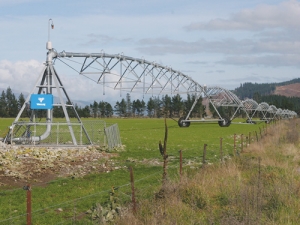Forest & Bird launches 2025–2026 Summer Adventure Challenges for all ages
Forest & Bird's Kiwi Conservation Club is inviting New Zealanders of all ages to embrace the outdoors with its Summer Adventure Challenges.
 IrrigationNZ says a severe El Nino could mean many farmers will run short of water half way through this season.
IrrigationNZ says a severe El Nino could mean many farmers will run short of water half way through this season.
With strong indications of an El Nino this summer, farmers are being urged to plan how they will use their seasonal irrigation volume.
IrrigationNZ says a severe El Nino could mean many farmers will run short of water half way through this season.
INZ chief executive Andrew Curtis was responding to NIWA's prediction that the current El Nino pattern is on track to be "the second most intense since 1950", with soils around the country drying out fast and irrigation in full swing as temperatures rise.
Guidelines released recently by the government urged farmers to use irrigation water efficiently and plan for water restrictions as they prepared for El Nino.
MetService says the pool of abnormally warm seas centred on the equator now extends right across the Pacific Ocean from South America to Vanuatu. Sea temperatures in August across the central Pacific exceeded 2 degrees above normal. It is the strongest El Nino since 1997-98, by all indicators.
Curtis says the focus for irrigators needs to be on spreading their water allocations further this season.
"Timing is everything in a marginal season. Irrigators need to start the season well and maintain consistent performance. Inefficient irrigation now will have a huge impact on whether your irrigation volume will see you through to March.
"Irrigation scheduling is central to this, particularly now irrigators are limited in the water they have in seasonal volumes. With water meters in place, irrigating farmers should be watching closely what they are using, regularly reviewing soil moisture levels and crop requirements and applying water as efficiently as possible. Following the dry winter there's no
room for waste or poor performance as every drop of water will be needed this summer. We recommend sitting down and planning your water budgets."
Appropriate irrigation scheduling, maintaining irrigation equipment and keeping it performing to specification will minimise down-time, leakage or delivery problems, Curtis says.
"Ensuring irrigators are working as they should guarantees you're getting the best from the water you apply. Simple early-season calibration checks can save a lot of water over the season and are a no-brainer to do. Some systems may be 20-30% out and using more water than you need will shorten your irrigation budget significantly."
As the season goes on, regular maintenance will be essential, says Curtis.
"Checking pressure and sprinklers is recommended.
Tips for summer
The Meat Industry Association of New Zealand (MIA) today announced that Chief Executive Officer Sirma Karapeeva has resigned from the role.
The winners of the 2026 Hawke’s Bay/Wairarapa Dairy Industry Awards were announced at the annual awards dinner held at Copthorne Solway Park in Masterton on Thursday evening.
Environment Southland is welcoming this week’s decision by the Environmental Protection Authority (EPA) to approve the release of Blaptea elguetai, a leaf‑feeding beetle that will help control the highly invasive Chilean flame creeper.
This March, the potato industry is proudly celebrating International Women’s Day on 8 March alongside the International Year of the Woman Farmer, recognising the vital role women play across every part of the sector — from paddocks and packhouses to research, leadership, and innovation.
Fruit trader Seeka posted a record profit and returns to shareholders in 2025.
Recent weather events in the Bay of Plenty, Gisborne/Tairawhiti, and Canterbury have been declared a medium-scale adverse event.
OPINION: Staying with politics, with less than nine months to go before the general elections, there’s confusion in the Labour…
OPINION: Winston Peters' tirade against the free trade deal stitched with India may not be all political posturing by the…